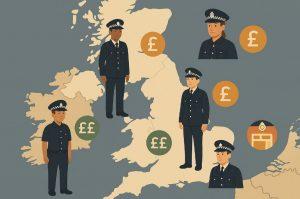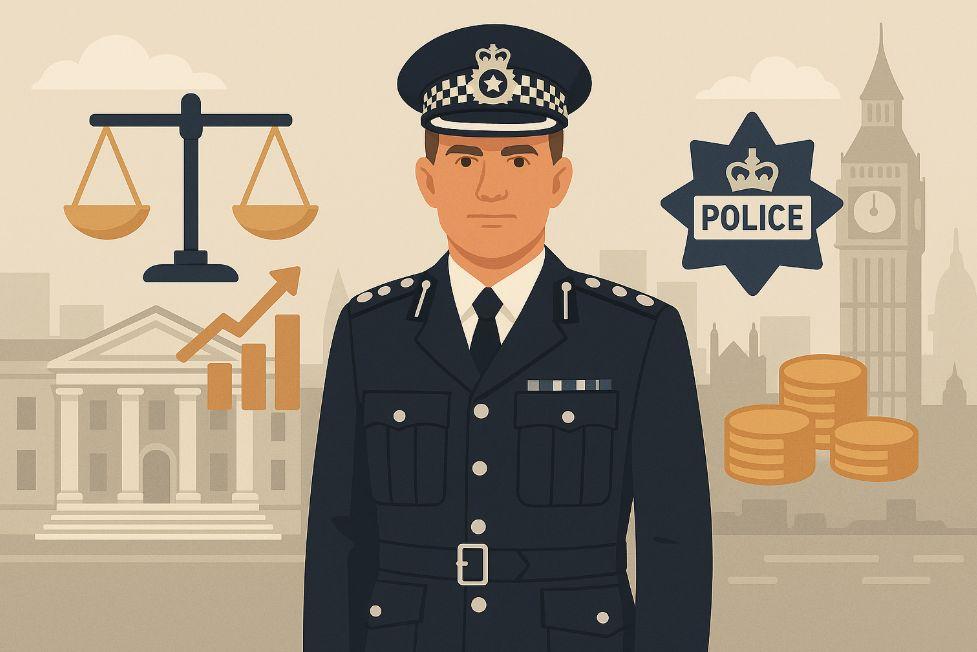In the complex structure of the UK public sector, few announcements garner as much attention as salary adjustments for high-ranking officials. In 2025, the Deputy Chief Constable (DCC) pay rise has become a focal point in conversations about public sector funding, workforce morale, and government priorities.
The salary increase, coming amidst wider debates around inflation and cost-of-living concerns, highlights critical shifts in public compensation structures.
This blog takes a closer look at the DCC pay rise examining its rationale, scope, comparisons across forces, and implications for local government bodies and the broader public sector.
By understanding the deeper context, we gain insight into how this financial adjustment may affect recruitment, workforce satisfaction, and the long-term trajectory of public service compensation in the UK.
What Is the DCC Pay Rise in 2025?

The Deputy Chief Constable (DCC) serves as the second-highest authority within UK police organisations, positioned just below the Chief Constable.
This role carries substantial leadership responsibility, overseeing operational strategies, managing personnel, and ensuring the force’s effectiveness in delivering public safety. These individuals bear significant operational and strategic responsibilities, and their remuneration reflects the weight of these duties.
In 2025, the DCC role has seen a notable salary adjustment. The Home Office, responding to both inflationary pressures and recruitment challenges, approved a nationwide public sector pay increase including adjustments for senior policing roles such as DCCs.
The media has spotlighted this rise due to its timing, scale, and broader implications across the public workforce. This pay revision reflects both the increased complexity of the role and the need to retain experienced leadership in a competitive labour market.
How Has the Deputy Chief Constable Salary Changed Over Time?
Over the years, the salary structure for DCCs has been shaped by recommendations from the Police Remuneration Review Body (PRRB) an independent advisory group that assesses and advises on fair pay levels across policing roles.
These guidelines help determine base salaries, progression rates, and regional variations based on the size and demands of each police force. These figures are influenced by the size of the force, the responsibilities of the role, and overall budget constraints within law enforcement and local authorities.
Historical Salary Trends
| Year | Starting DCC Salary | Maximum DCC Salary | Annual Increase (%) |
| 2018 | £105,000 | £115,000 | 1.5% |
| 2020 | £110,000 | £120,000 | 2.5% |
| 2023 | £117,000 | £130,000 | 3.8% |
| 2025 (New) | £125,000 | £138,000 | 4.5% |
The 2025 increase marks the highest percentage increase in over a decade, aligning with other public sector pay updates, such as NHS and civil service workers.
What Are the Key Factors Behind the Latest Public Sector Pay Increases?
Several factors have influenced the government’s decision to authorise the latest DCC pay rise:
Rising Inflation and Cost of Living
Inflation in the UK has remained high over the last two years, affecting household affordability and employee satisfaction. The pay rise aims to counterbalance these economic pressures, especially for senior public officials in demanding roles.
Recruitment and Retention Challenges
Police forces, like other public sector organisations, have faced difficulties in attracting and retaining top talent. Leadership vacancies and early retirements have put pressure on the workforce, and competitive compensation is seen as a necessary response.
National Pay Bargaining and Political Pressure
Unions and review boards have pushed for fairer, inflation-linked pay adjustments. The Police Federation and other stakeholders have lobbied for remuneration reforms to reflect workload increases and ensure parity with equivalent roles in different sectors.
How Does the DCC Pay Rise Compare Across UK Police Forces?

The DCC pay is not universally fixed. Although national guidelines provide a range, final figures are influenced by force size and location. London typically offers higher remuneration due to living costs and the scale of responsibilities.
DCC Salary Comparison by Region (2025)
| Police Force | Starting Salary (£) | Top-End Salary (£) |
| Metropolitan Police (London) | £128,000 | £138,000 |
| Greater Manchester Police | £124,000 | £133,000 |
| West Midlands Police | £122,000 | £131,000 |
| West Yorkshire Police | £120,000 | £130,000 |
| Thames Valley Police | £118,000 | £128,000 |
| North Yorkshire Police | £115,000 | £125,000 |
The data shows a clear pay gradient favouring larger, urban forces, where operational complexity justifies higher salaries.
What Are the Implications for Local Government and Budget Planning?
Salary increases for senior public officials have ripple effects on local government financial planning. Local authorities, which partly fund policing through council tax and government grants, must accommodate these pay rises within already tight budgets.
Budgetary Considerations for Councils
Many councils in London and beyond have raised concerns about affordability, especially when managing simultaneous demands in housing, education, and social care. While police pay rises are partially centrally funded, the administrative burden often falls to local planning teams.
Furthermore, public sector pay adjustments can prompt requests for similar salary reviews across other departments, amplifying fiscal strain and leading to difficult trade-offs in service provision.
How Are Police and Public Sector Workers Reacting to the Pay Rise?
The reaction to the DCC pay rise has been mixed. While senior officers and unions have welcomed the move as overdue, there’s frustration among junior ranks and other public workers who feel left behind.
Union and Staff Responses
Organisations such as the Police Federation have called for “equity and consistency” across all police roles, arguing that frontline officers should also benefit from inflation-linked raises. At the same time, public sector unions (covering NHS, teachers, and civil servants) continue to press for proportional adjustments.
There’s also public scrutiny regarding the optics of increasing executive pay during a time of austerity in many local communities. Transparency and justification of such pay rises remain vital for maintaining trust.
Could This Trigger Further Pay Reforms Across the Public Sector?

The DCC pay rise could act as a catalyst for broader reforms in public compensation. Already, several professional associations have renewed their campaigns for updated pay bands across education, healthcare, and local government.
Interconnected Sectors Seeking Change
- NHS consultants are demanding structured increases
- Civil service workers are lobbying for multi-year pay settlements
- Teachers are engaging with the Department for Education for updated pay scales
If the DCC pay rise is perceived as successful in improving morale and leadership retention, it may influence how other departments negotiate future pay deals.
What Does the Future Hold for DCC Pay and Public Sector Compensation?
Looking forward, compensation strategies for DCCs and other senior roles will likely align more closely with performance metrics, workforce data, and inflation trends.
Experts suggest that structured pay progression tied to service outcomes and workforce stability will become more common. Additionally, the use of performance-based incentives may become part of future compensation models.
The question remains: can the public sector sustain such salary increases without undermining budgets or public confidence?
How Does the DCC Pay Rise Reflect Changing Priorities in UK Public Policy?
The 2025 DCC pay rise is not occurring in a vacuum it signals a broader shift in how the UK government is framing public sector remuneration as part of long-term workforce sustainability and security strategy.
Shifting Government Priorities
Over the past few years, there has been a noticeable pivot in policy discussions around investing in leadership and strategic capacity across essential public services. The government, especially in the wake of post-pandemic workforce shortages, appears to be realigning priorities to:
- Retain experienced senior personnel in roles where continuity and expertise are crucial
- Make public service careers more appealing for future leadership candidates
- Stabilise sectors where understaffing at the top could compromise public safety or service delivery
In the case of DCCs, the role has grown more complex, involving inter-agency coordination, counter-terrorism oversight, cybercrime strategy, and operational delivery across diverse and high-pressure scenarios.
By investing in their compensation, the state is acknowledging the importance of resilience and long-term planning in public leadership a shift that could redefine public sector hierarchy and how leadership is valued across various services.
Is the DCC Pay Rise a Signal for Salary Modernisation in the UK Public Sector?

Yes, and increasingly so. The DCC salary adjustment is now being seen as a potential benchmark or test case for modernising the outdated public sector pay frameworks that have long been criticised for rigidity and inequity.
Performance-Linked Compensation
There is growing interest in tying salary progressions and bonuses to key performance indicators (KPIs) and organisational impact. In policing, this could include crime resolution rates, staff retention, or community trust metrics.
Transparent Pay Structures
Public confidence in pay reform hinges on transparency. Future strategies may include clearer salary bands, published justification for raises, and annual public audits.
Digital & Hybrid Roles Valuation
As roles evolve to include digital oversight and data strategy (particularly in cyber and intelligence units), there’s a need to appropriately value new skillsets and specialisations.
Cross-Sector Alignment
The DCC rise may encourage other sectors (e.g., NHS administration, civil service directors) to assess alignment with similar levels of responsibility and stress.
The 2025 DCC pay increase, if successful, could spearhead this broader movement toward a more modern, fair, and efficient public sector pay model one that’s fit for purpose in an era of complexity and rapid change.
Conclusion
The 2025 DCC pay rise stands as a significant development in public sector compensation policy. While it reflects genuine operational needs and economic realities, it also introduces fresh challenges for local government, public service parity, and budgetary balance.
For London and other urban centres, the increase is both a response to leadership demand and a litmus test for future reforms across the public workforce. As the UK continues to navigate economic uncertainty, the path ahead for public sector pay remains complex with the DCC pay rise at the heart of this evolving narrative.
FAQs
What is the current salary for a Deputy Chief Constable in the UK?
As of 2025, DCC salaries range from £125,000 to £138,000 depending on the region and size of the force.
Are public sector pay rises keeping pace with inflation?
Recent increases, including the DCC pay rise, are closer to matching inflation, but many lower-level staff feel their wages still lag behind cost-of-living increases.
How are DCC roles funded in London?
DCC roles are funded through a mix of central government support and contributions from local councils via council tax allocations.
Will other police ranks see a similar pay increase?
Some adjustments have been proposed for other ranks, but not at the same level. Unions are pushing for fairer raises across all levels.
What is the national pay bargaining process in the UK?
It’s a structured negotiation between government departments, pay review bodies, and unions to decide annual salary changes across the public sector.
Has the DCC pay rise affected recruitment or retention?
Yes, early indicators suggest improved retention at senior levels and increased interest in leadership roles due to better pay structures.
Are there regional disparities in DCC compensation?
Absolutely. London and other major metropolitan areas offer higher salaries compared to smaller or rural forces, due to cost of living and operational scope.









Leave feedback about this